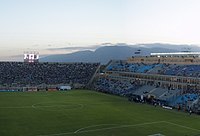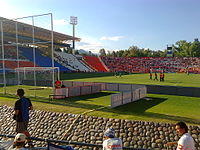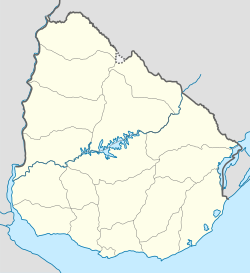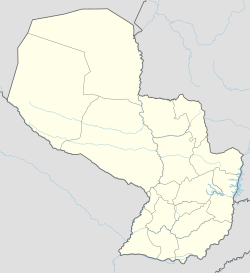Uruguay–Argentina–Chile–Paraguay 2030 FIFA World Cup bid
| intended bid by Uruguay–Argentina–Paraguay 2030 | |
|---|---|
| File:Uruguay-Argentina-Paraguay 2030.png | |
| Tournament details | |
| Host countries | |
| Teams | unknown (under current rules: 48) (from 6 confederations) |
| Venue(s) | 25[citation needed] (in 15 host cities)[citation needed] will cut to 16 likely |
The Uruguay–Argentina–Paraguay 2030 FIFA World Cup bid[1][2] is an intended joint bid to host the 2030 FIFA World Cup by Uruguay, Argentina and Paraguay. The intended bid had initially been shared between only Uruguay and Argentina.[3][4] The intended bid followed an earlier web movement claiming that FIFA should give Uruguay hosting rights for the 100th anniversary of the first World Cup, which was held in Uruguay. Argentina has interest as[citation needed] their national team played the final, which resulted in a defeat against the host team.
The Uruguay–Argentina intention to bid was officially confirmed on 29 July 2017 before Paraguay was confirmed as the third host on 4 October 2017. Chile and Peru are also rumoured to be interested in hosting.[5]
Background
The project was originally the idea of Abel Fialko,[6] a Uruguayan who lives in Israel.
Athens, the capital of Greece, the home of the ancient and first modern 1896 Summer Olympics, was considered by many observers during the 1996 bidding period as "the natural choice" for the Centennial Olympic Games of 1996. However, in the end, the US city of Atlanta was selected to host the Centennial Olympics. In 1997, Athens won the right to host the 2004 Summer Olympics.
Because of that incident, Fialko had a real concern that Uruguay's "historical rights" to host the 2030 FIFA World Cup (because Uruguay hosted the first edition of that tournament) would not be enough, and that Uruguay would end up having the same fate as Athens' failure to host the 1996 Olympics.[6]
Fialko then launched a website[7] in 1997 and began using the Internet to gather more and more people to his cause.[8]
Using the benefits of the Internet to his advantage, and realizing that through it, the World was literally a global village, Fialko managed to bring upon himself the attention of many of his countrymen. Soon the world media learned of the initiative and Fialko was interviewed several times.[9][10][11][12]
On 4 October 2005, during his visit to Uruguay to commemorate the 75th anniversary of the inaugural FIFA World Cup, FIFA President Sepp Blatter had a meeting with the Uruguayan President Tabaré Vázquez. In that meeting Vázquez formally suggested that Uruguay could co-host the 2030 FIFA World Cup with another Mercosur nation to commemorate the centenary of Uruguay 1930.
After the meeting, Blatter stated, "During our meeting, the President told me of his dream of seeing this tournament hosted in the region. I told him that today's dream could be tomorrow's vision, which in turn could become a proper initiative and finally a project. At present, the South American Football Confederation is scheduled to host the 2014 FIFA World Cup, and all (national) associations will be able to present their candidature when we begin the selection process at the end of 2006. Dr Nicholas Leoz tells me that with the system of rotation it will be the turn of South America in 2030. That is the situation as it currently stands.".[13]
Announcement of the intention to bid

The bidding period has not started, so an official bid is not possible at this stage. A joint bid intention was announced by the Argentine Football Association and the Uruguayan Football Association on 29 July 2017.[14] Before Uruguay and Argentina played out a goalless draw in Montevideo, Uruguay player Luis Suárez and Argentine captain Lionel Messi – who happened to be teammates at FC Barcelona – promoted the bid with commemorative shirts.[15]
On 31 August 2017, it was suggested Paraguay would join as a third host.[16] CONMEBOL, the South American confederation, confirmed the joint three-way bid in September 2017.[17] The inclusion of Paraguay as a host had previously been opposed by key Uruguayan Football Association official Wilmar Valdéz and President Tabaré Vázquez.[18][19]
Bid process
The Bidding Process is yet to begin but is expected to begin in 2020.
FIFA football tournament hosting experiences
Together, Argentina and Uruguay have hosted four FIFA events. Paraguay have yet to host a FIFA event, although they have hosted the 1999 Copa América.
 Paraguay
Paraguay
Key people
- Claudio Tapia – president of the Argentine Football Association
- Robert Harrison – president of the Paraguayan Football Association
- Wilmar Valdez – president of the Uruguayan Football Association
Potential venues
For the 2026 FIFA World Cup, it has been confirmed that stadiums must have a capacity of at least 40,000 for group round matches and second round matches, 40,000 for quarter final and 60,000 for the semi-finals and at least 80,000 for the Opening Match and Final; none of the countries concerned have stadiums with such a capacity for the opening and final matches as of yet and the rules for 2030 have not been announced.[20]
There are no specific details of the venues that will be proposed by the Uruguay-Argentina or Uruguay-Argentina-Paraguay bid, but according to the statements, some information can be deduced. According to information that made public after Paraguay aspire to be included in the event, it was unofficially known that Argentina would have eight venues, that Uruguay would have three stadiums and that Paraguay would add two scenarios to the proposal.[21]
Uruguay
The Estadio Centenario would be one of the Uruguayan stadiums, and a candidate to host the final match. According to the president of the Uruguayan Football Association (AUF), Wilmar Valdez, Uruguay will have only two cities hosting matches, which will be Montevideo and Maldonado.
A likely candidate for a host stadium would be the Centenario Stadium, where the final of the first world championship was played in 1930 and is Uruguay's largest stadium. With respect to the Maldonado sub-station, it would be the only stadium in that department, Domingo Burgueño Miguel Stadium. However, the organization plans a third stadium in Uruguay, which would be another one in the Montevideo sub-center.
Only two other stadiums in Montevideo could be taken into account: the Estadio Gran Parque Central (also host the first World Cup), or the recently inaugurated Estadio Campeón del Siglo. Also since the end of 2012, National has been promoting the inclusion of Gran Parque Central as the second stadium of Montevideo venue in 2030,[22] which it ratified again in 2017.[23][24] The argument that will be presented for FIFA to considerate the National request for a second stadium in Montevideo will be the history of the stadium as one of the first two World Cup stadiums, together with the former Pocitos Stadium.[25] According to the president of the AUF, Wilmar Valdez, the stadium of Peñarol (Estadio Campeón del Siglo) will not be taken into account due to its accessibility problems.[26]
In April 2018 it was confirmed that Uruguay would present two venues (Montevideo and one in the interior of the country) and that the Uruguayan organization would have four stadiums: Centenario, Gran Parque Central and Campeón del Siglo in Montevideo, and also a new stadium outside of the capital.[26] 300 million dollars will be inverted[clarification needed] to modernize the Estadio Centenario and another stadium will be built in the interior (probably in Punta del Este) with an investment of also 300 million dollars.[27]
| Montevideo | |||
|---|---|---|---|
| Estadio Centenario |
Estadio Campeón del Siglo | Estadio Gran Parque Central |
Estadio Luis Tróccoli |
| Capacity: 60,235 | Capacity: 40,005 | Capacity: 26,500 | Capacity: 25,000 |

|

|

|

|
| Rivera | Paysandú | Maldonado | |
| Estadio Atilio Paiva Olivera | Estadio Parque Artigas | Estadio Domingo Burgueño | |
| Capacity: 27,135 | Capacity: 23,000 | Capacity: 22,000 | |

|

|

| |
|
Uruguayan cities |
Venues in Montevideo | ||
Paraguay
The fact of planning a joint bid between Uruguay and Argentina for the 2030 World Cup, corresponds to the fear of the Uruguayans of not being able to host a world tournament due to its scarce sports infrastructure. For this reason, the Paraguayan intention is to provide two venues and argue their inclusion in order to ensure the success of the candidacy.
In this case, about possible Paraguayan stadiums, both scenarios will correspond to the Asunción sub-sector, and it is speculated that they will be the Defensores del Chaco Stadium and the recently reopened General Pablo Rojas Stadium, popularly known as La Nueva Olla.[21] Like the Uruguayan case with Montevideo, Paraguay must receive the authorization of FIFA for that the sub-office in Asunción can provide two stadiums for the candidature.
In turn, the second Paraguayan headquarters would be in Ciudad del Este or Encarnación.[28] The Antonio Aranda Stadium (Ciudad del Este) is could be the second Paraguayan headquarters, following a project by the club 3 de Frebrero to modernize the stadium and have a capacity of 50.000 spectators, being the biggest stadium in Paraguay.[29]
| Asuncion | ||
|---|---|---|
| Estadio General Pablo Rojas | Estadio Defensores del Chaco | Estadio Manuel Ferreira |
| Capacity: 45,000 | Capacity: 42,354 | Capacity: 22,000 |

|

|

|
| Ciudad del Este | Luque | Pedro Juan Caballero |
| Estadio Antonio Oddone Sarubbi | Estadio Feliciano Cáceres | Estadio Río Parapití |
| Capacity: 28,000 | Capacity: 24,000 | Capacity: 22,000 |

|

|
|
|
Paraguayan proposed venues | ||
Argentina
In 2012, after a meeting between executives from Uruguay and Argentina, it was confirmed that the Estadio Ciudad de La Plata and the Estadio Centenario would be two of the main venues of the project.[30]
Also a new stadium in Santiago del Estero, the Estadio Único de Santiago del Estero will be built for the candidature.[31][32][33][34]
In October 2017, an official councilor from Mar del Plata proposed to start a process so that the city could be declared as an Argentine sub-venue for the event.[35] Also San Juan was also proposed as a venue of the World Cup, planning to reform the Estadio San Juan del Bicentenario.[36]
| Buenos Aires | La Plata | ||
|---|---|---|---|
| Estadio Monumental Antonio V. Liberti |
Estadio José Amalfitani |
La Bombonera | Estadio Ciudad de La Plata |
| Capacity: 61,688 | Capacity: 49,540 | Capacity: 49,000 | Capacity: 53,000 |

|

|

|

|
| Avellaneda | Córdoba | San Juan | |
| Estadio Presidente Juan Domingo Perón | Estadio Libertadores de América | Estadio Mario Alberto Kempes |
Estadio San Juan del Bicentenario |
| Capacity: 47,027 | Capacity: 55,389 | Capacity: 57,000 | Capacity: 25,286 |

|

|

|

|
Proposed venues in Argentina |
Rosario | ||
| Estadio Marcelo Bielsa | Estadio Gigante de Arroyito | ||
| Capacity: 42,000 | Capacity: 41,465 | ||

|

| ||
| Santa Fe | Mendoza | ||
| Estadio Brigadier General Estanislao López | Estadio Malvinas Argentinas | ||
| Capacity: 47,000 | Capacity: 40,268 | ||

|

| ||
See also
References
- ^ Conmebol promociona el Mundial de Uruguay-Argentina-Paraguay 2030
- ^ Uruguay tiene la prioridad para recibir la final del Mundial 2030, anuncian presidentes
- ^ Valdez: "La candidatura original es Uruguay-Argentina” (in Spanish)
- ^ Messi y Suárez apadrinan el Mundial Uruguay Argentina 2030 (in Spanish)
- ^ Chile no se rinde con ser sede (in Spanish)
- ^ a b La Republica, 25 October 2007 Archived 16 November 2009 at the Wayback Machine
- ^ "Uruguay 2030 - www.Uruguay2030.org". 21 March 2004. Archived from the original on 21 March 2004.
{{cite web}}: Unknown parameter|deadurl=ignored (|url-status=suggested) (help) - ^ "Inside World Football, 25 November 2009". Archived from the original on 26 July 2012. Retrieved 4 May 2013.
{{cite web}}: Unknown parameter|deadurl=ignored (|url-status=suggested) (help) - ^ "¡Uruguay 2030!", Revista Quinto Dia, 15 May 1998, archived from the original on 8 March 2012
{{citation}}: Unknown parameter|deadurl=ignored (|url-status=suggested) (help) - ^ Caballero, Soledad (9 June 1998), "El Mundial de 2030 en Uruguay", El Observador, archived from the original on 8 March 2012
{{citation}}: Unknown parameter|deadurl=ignored (|url-status=suggested) (help) - ^ Cabrera, Sebastian (8 July 1998), "Volver al Futuro", Revista Guambia, archived from the original on 8 March 2012
{{citation}}: Unknown parameter|deadurl=ignored (|url-status=suggested) (help) - ^ Chantal, Sylvain (25 July 2001), "Uruguay 2030,un rêve romantique", France Football, archived from the original on 8 March 2012
{{citation}}: Unknown parameter|deadurl=ignored (|url-status=suggested) (help) - ^ "FIFA official website, 11 October 2005". Archived from the original on 30 April 2010.
{{cite web}}: Unknown parameter|deadurl=ignored (|url-status=suggested) (help) - ^ Dudko, James (29 July 2017). "Argentina, Uruguay Announce Bid to Host 2030 FIFA World Cup". Bleacher Report. Turner Broadcasting System.
- ^ Gadd, Mick (1 September 2017). "Lionel Messi and Luis Suarez campaign for Uruguay and Argentina's 2030 World Cup bid before 0-0 draw". Daily Mirror.
- ^ "Es oficial: Paraguay se suma a la candidatura de Argentina y Uruguay para el Mundial 2030" [It's official: Paraguay adds itself to the Argentina and Uruguay bid] (in Spanish). 5 September 2017.
- ^ "Sin Messi ni Suárez, así es el primer video promocional para la candidatura del Mundial 2030" [Without Messi and Suarez, here is the first promotional video for the 2030 World Cup bid] (in Spanish). 5 September 2017.
- ^ Molestia en Uruguay por video de Conmebol (in Spanish)
- ^ Uruguay amenaza con bajarse del Mundial 2030 si se suma Paraguay - El Observador, 20 September 2017
- ^ "UNITED BID COMMITTEE COMMENCES OUTREACH FOR POTENTIAL HOST CITIES IN BID FOR 2026 FIFA WORLD CUP". US Soccer. Retrieved 15 August 2017.
- ^ a b Se sumó Paraguay y ahora el sueño de recibir la Copa del Mundo es tripartito
- ^ "Nacional apunta al Gran Parque Central como estadio para el mundial de 2030 (Spanish)".
- ^ ""El partido inaugural del Mundial 2030 debe jugarse en el Gran Parque Central" (Spanish)".
- ^ "El ambicioso plan de National con su estadio para el Mundial 2030 (Spanish)".
- ^ "Más grande para 2030 (Spanish)". Archived from the original on 9 September 2011.
- ^ a b "Repartieron sedes del Mundial 2030: ocho en Argentina, dos en Uruguay y en Paraguay (Spanish)". "Jugarían en los estadios Centenario, Campeón del Siglo y Parque Central en Montevideo y en otro en el interior".
- ^ "Uruguay ante el desafío de un estadio mundialista (Spanish)".
- ^ "La segunda sede podría ser Ciudad del Este o Encarnación", añadió." (Spanish)
- ^ El 3 de Febrero proyecta tener el estadio más grande de Paraguay (Spanish)
- ^ "De la mano - Uruguay y Argentina piensan en Mundial 2030 (Spanish)".
- ^ "Así lucirá el estadio que construirá Argentina pensando en el 2030 (Spanish)".
- ^ "Video: así será el Estadio Único de Santiago del Estero (Spanish)".
- ^ "Así será el Estadio Único de Santiago del Estero que será sede de la Selección (Spanish)".
- ^ "Así será el Estadio Único de Santiago del Estero (Spanish)".
- ^ "Proponen a Mar del Plata como subsede para el Mundial de Fútbol 2030 (Spanish)".
- ^ "San Juan ya se propone como subsede del Mundial 2030 (Spanish)".




